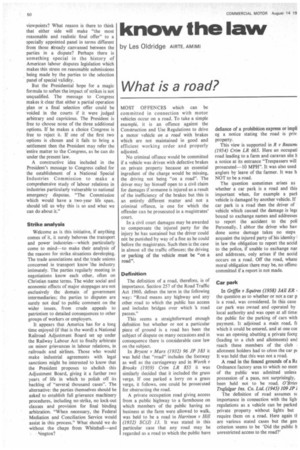know the law
Page 52

If you've noticed an error in this article please click here to report it so we can fix it.
by Les Oldridge AIRTE, AMIMI
What is a road?
MOST OFFENCES which can be committed in connection with motor vehicles occur on a road. To take a simple example, it is an offence against the Construction and Use Regulations to drive a motor vehicle on a road with brakes which are not maintained in good and efficient working order and properly adjusted.
No criminal offence would be committed if a vehicle was driven with defective brakes on private property because an essential ingredient of the charge would be missing, the driving not being "on a road". The driver may lay himself open to a civil claim for damages if someone is injured as a result of the inefficiency of the brakes but this is an entirely different matter and not a criminal offence, ie one for which the offender can be prosecuted in a magistrates' court.
In a civil court damages may be awarded to compensate the injured party for the injury he has sustained but the driver could not be punished by way of a fine as he could before the magistrates. Such then is the case in almost all the traffic offences; the driving or parking of the vehicle must be "on a road".
Definition The definition of a road, therefore, is of importance. Section 257 of the Road Traffic Act 1960, defines the term in the following way: "Road means any highway and any other road to which the public has access and includes bridges over which 1 road passes."
This seems a straightforward enough definition but whether or not a particular piece of ground is a road has been the subject of dispute on many occasions and in consequence there is considerable case law on the subject.
In Bryant v Marx (1932) 96 JP 383 it was held that "road" includes the footway as well as the carriageway and in Worth v Brooks (1959) Crim LR 855 it was similarly decided that it included the grass verge. If one parked a lorry on a grass verge, it follows, one could be prosecuted for obstructing the road.
A private occupation road giving access from a public highway to a farmhouse on which members of the public having no business at the farm were allowed to walk, was held to be a road in Harrison v Hill (1932) SC(J) 13. It was stated in this particular case that any road may be regarded as a road to which the public have
defiance of a prohibition express or impli eg a notice stating the road is priv. property.
This view is supported in R v Beaunu (1954) Crim LR 665. Here an occupati road leading to a farm and caravan site h a notice at its entrance "Trespassers will prosecuted-10 MPH". It was also used anglers by leave of the farmer. It was h NOT to be a road.
The question sometimes arises as whether a car park is a road and this important when, for example a panl vehicle is damaged by another vehicle. If car park is a road then the driver of vehicle which caused the damage is legE bound to exchange names and addresses to report the accident to the poli Personally, I abhor the driver who hay done some damage takes no steps acquaint the injured party of his identity I in law the obligation to report the accid to the police, if unable to exchange nan and addresses, only arises if the accid occurs on a road. Off the road, whate moral obligation there may be, no offene committed if a report is not made.
Car park
In Grfffin v Squires (1958) 3A11 ER the question as to whether or not a car p is a road, was considered. In this case car park was owned and operated by local authority and was open at all time the public for the parking of cars with payment. It adjoined a main road, ft which it could be entered, and at one cot was an opening abutting a private footp (leading to a club and allotments) and reach these members of the club ; allotment holders had to doss the car ix It was held that this was not a road.
A road in the fenced grounds of a Rc Ordnance factory area to which no mem of the public was admitted unless possession of a pass, not surprisingly, been held not to be road. O'Brie? Trafalgar Ins. Co. Ltd. (1945) 109 JP/
The definition of road assumes st importance in connection with the high! regulations as a vehicle can be parked private property without lights but require them on a road. Here again ti are various stated cases but the gen criterion seems to be 'Did the public h unrestricted access to the road?'




























































































